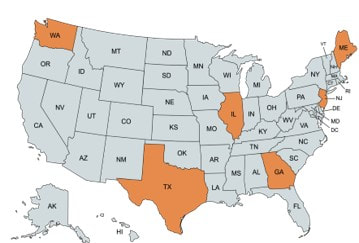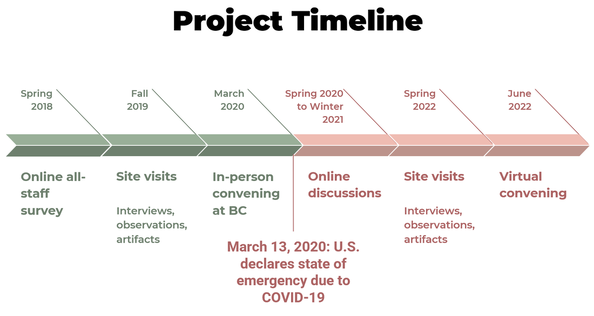About the PIECE Project
- Research Collaborative
- Partnership with 6 districts in the US
- Mixed-methods, longitudinal study
- Spring 2018-Spring 2023
- Funded by W.T. Grant and Spencer Foundations
Objectives |
|
Major Findings |
Domains of educator practices. Based on findings from analyses, we found that educators’ practices in response to threats to immigrant-origin youth fell into four domains: (a) signaling affirmation, (b) building shared knowledge and capacity, (c) finding and mobilizing resources, and (d) creating space for conversation. Our all-staff survey highlighted how all of these practices took place across roles and levels within the district, as educators, leaders, and other staff engaged in them. We also found that district context shaped how these practices were enacted. In this way, we have developed a richer understanding of how nested contexts of reception influence educator practices which in turn shape the school experiences of immigrant-origin youth.
Safety and belonging. Relatedly, we also found that educators’ perceptions of safety and belonging were shaped by their context. Many educators in the study viewed their work as bounded by the school walls. However, some educators sought to engage immigrant advocacy groups and external community members in efforts to address issues of safety and belonging outside of school that mattered within school. Additionally, we found that issues of safety in other domains (e.g. SROs, school shootings) influenced how educators thought about issues of safety for immigrant-origin students. Similarly, discourses around inclusion for all students were linked to educators’ reflections on questions of belonging related to immigrant-origin students. Disrupted contexts of reception. In this paper, we conceptualize the COVID-19 pandemic as a disruption to contexts of reception. Based on the analysis of Zoom meetings, we found the geographic location, existing infrastructure relevant to pandemic response, and local policies and politics differentially impacted these contexts of reception. In order to meet immigrant-origin students’ and families’ needs, district leaders in our study used a variety of sustaining, adaptive, and innovative practices to maintain existing structures, furthering existing priorities, and pushing forward the district vision, respectively. We found that leaders sought to enact these practices with a focus on the acute and particular needs of immigrant-origin students and families during the pandemic with a focus on ameliorating exacerbated inequalities in disrupted contexts of reception. Caring through crisis. In this paper, we explore the COVID-19 pandemic’s impact on the ethics of care in one of our partner districts. Based on the analysis of Zoom meetings, one-on-one interviews, and online communications from the district, we found that educators struggled with how to balance their own needs with their responsibility and desire to serve their newcomer immigrant students. Specifically, they worried about their risk of contracting COVID-19, keeping their own families healthy, making sure their students were safe, and adapting their classroom practices for social distancing. District leaders also struggled with the ethics of hiring temporary workers, many of whom are themselves immigrants of color, to support newcomer students in front-line positions with no guarantee of permanent employment. Educators’ roles and responsibilities. Our paper explores how teachers’ personal and professional identities and context influence their understanding of their responsibilities in serving immigrant-origin students and caregivers. Based on survey data, we found that some educators discuss supporting immigrant-origin students and their families as part of their job or that doing that is needed, while a subset of educators consider this task as not part of their job for various reasons. Educators who work directly with English Learners are more likely than their peers to have an opinion on this topic. We also found that educators of color or with experiences of immigration felt having an additional responsibility because of their identities. However, this does not necessarily lead to a sense of collective responsibility district-wide, even when formal leaders create positions that attempt to leverage distributed leadership. Supporting immigrant-origin youth in the midst of pandemic. We found that our districts were differentially impacted by the virus, highlighting the salience of context in the midst of this crisis. State contexts seemed particularly relevant as each state developed its own set of guidelines and districts navigated the challenges of reopening and providing services in the midst of the ongoing pandemic. Geographic context related to infrastructure also played a role, particularly in terms of the technological infrastructure to support remote learning. These features of local contexts emerged as central to district responses amid the pandemic. |


